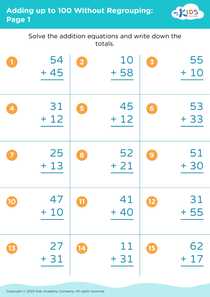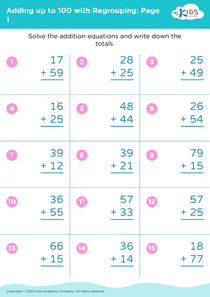Identifying shapes Adding up to 100 Misc Worksheets for Ages 3-8
3 filtered results
-
From - To
Unlock the joy of learning for children ages 3-8 with our engaging "Identifying Shapes" and "Adding up to 100" worksheets. At Kids Academy, we provide an array of captivating activities designed to bolster foundational math skills while making learning fun. Young learners will enjoy differentiating between geometrical shapes and practicing their addition prowess in creative exercises tailored to their developmental stage. Each worksheet is crafted to inspire curiosity, build confidence, and enhance problem-solving abilities. Perfect for classroom use or at-home practice, our resources support your child’s educational journey, setting the stage for lifelong success in math.
Gently nurturing foundational skills in early childhood through activities like identifying shapes and learning to add up to 100 is crucial for children's cognitive and academic development. Parents and teachers should care about these activities for several key reasons.
Identifying shapes helps children in recognizing and categorizing the world around them. This not only builds spatial awareness but also strengthens their ability to differentiate objects by size, color, and form, a skill fundamental for early geometry and later complex mathematical concepts.
Adding up to 100 lays the groundwork for numerical literacy and arithmetic. These skills are essential for future math success. By mastering basic addition, children understand the concept of numbers, develop problem-solving skills, and gain confidence in handling everyday tasks involving math.
Engaging in miscellaneous learning activities like puzzles, reading readiness, and fine motor skills also broadens their learning landscape. It boosts cognitive abilities, creativity, and linguistic skills. Such diverse exposures ensure a balanced development, preparing children not only academically but also socially and emotionally, setting them on a path to becoming well-rounded individuals.
Investing time and energy in these early learning experiences gives kids the best start, ensuring they are prepared for the academic demands ahead and fostering a lifelong love for learning.

















